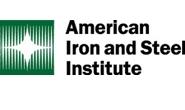Government/Policy

February 4, 2018
Steel Leaders Ask Trump for Action on Section 232
Written by Sandy Williams
U.S. steelmakers sent a letter to President Trump on Feb. 1 urging the administration to take action against steel imports under Section 232. The letter from the American Iron and Steel Institute stressed that immediate action is needed to prevent imports from recapturing nearly a third of the U.S. market as they did last June.
“Since the 232 investigation was announced in April 2017, imports have continued to surge. In June of 2017, steel imports hit their highest monthly total in more than two years by capturing 30 percent of the U.S. market. We need strong action that meaningfully adjusts imports and restores healthy levels of capacity utilization and profitability to the domestic industry to ensure we can continue to produce the steel needed for our national security and critical infrastructure.”
Excess steel capacity is at the root of the problem, said AISI. The resulting surge of imports is not related to China alone. Brazil, South Korea, Russia, Turkey and Japan shipped the largest amounts of steel imports into the U.S. in 2017. Foreign steel imports took 27 precent of U.S. market share last year, yet U.S. capacity utilization only averaged 74 percent.
“Efforts to address global excess capacity through international organizations, like the G-20 and the Organization for Economic Cooperation and Development, have to date failed to produce an effective solution, and the U.S. industry continues to suffer the consequences of surging steel imports. This is why a remedy under Section 232 is necessary.”
The letter signed by 25 steel executives and association leaders was the second to be sent by the steel industry to Trump in the last five months. The Section 232 report was delivered to Trump in December, giving him 90 days to decide what actions to take, if any. Advocates for the trade measure were disappointed that the president made no mention of Section 232 during the State of the Union message.
The industry is asking for a comprehensive remedy that covers the full range of steel products with only limited exceptions for products not currently available in the United States. Loopholes that allow circumvention must be closed and the remedy must be of a “sufficient duration to allow time for the domestic industry to make new investments that will enhance U.S. steel production, thereby preserving and strengthening the national defense industrial base.”
AISI appealed directly to the president to keep his promises. “Upon taking office you took bold steps to launch a path for addressing this ongoing crisis. Now only you can authorize action to stop the relentless inflow of foreign steel that threatens the future of the American steel industry and our ability to meet the country’s national security needs.”
Speaking for the many who oppose Section 232, Washington trade attorney Lewis Leibowitz expressed concern about how import restrictions on “the full range of steel products, with limited exceptions” would affect American manufacturers and the thousands of workers they employ. “If the remedy is as ‘comprehensive’ as requested by domestic steel companies, the impact on steel consumers could be devastating,” Leibowitz said. “There is no guarantee that, if imports are restricted or closed down, domestic producers will step up to meet domestic demand for highly specialized steel products. They seem to want protection but no obligation to consider the workers in steel-consuming industries who outnumber steelworkers 60 to 1.”







